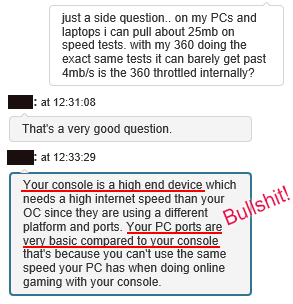I recently contacted Microsoft Support regarding a billing issue, nothing important nor anything serious, but while i was waiting for my Xbox 360 to reboot I figured I’d ask the support guy a question as to why my 360’s internet speeds are so much slower than what i can pull from any of my PC, laptops, or even my tablet. I couldn’t cut and paste the Q&A so I made a screenshot.
According to him an 8 year old $200 console is more “High End” than my +$2500 PC that’s less than a year old? OH really? The fucking MOTHERBOARD I got for it costs more than an Xbox 360 for fucks sake. For the sake of the argument lets assume he is correct. If a 360 is more high end than my PC, then why is it getting SLOWER SPEEDS than any other of my internet connected devices which are all connected to the my SAME router (wired and wifi) and using the SAME web site to test internet speeds? Wouldn’t it be getting FASTER speeds if my 360 was so “high end?”
An Xbox 360 has a PowerPC three-core 64bit CPU, which even APPLE abandoned on the Mac line some years ago since PowerPC chips are DOG ass slow, only supporting PC100 SRAM from 15 years ago. As for the RAM the 360 (and the PS3) only have 512mb of RAM. Yes a half a Gig of RAM, which seems unheard of now a-days. Most PCs come with a BARE minimum of 4gb, EIGHT TIMES that of these old consoles. My PC has 16GB of DDR3 1600 RAM in QUAD CHANNEL mode. I’m sure the 360’s RAM is still in single channel mode, running at 100mhz like I used too back in the Pentium II days in the late 90s.
Note how the tech talked about ports. This could mean two different things, internet port numbers (80 for web, 995 for POP3 email) or likely he was referring to the physical ports on the console. Ethernet ports, and USB ports. First of all the 360 doesn’t even have gigabit Ethernet, also the USB ports are all v2.0. While my PC has Gigabit Ethernet and USB 3.0. So in this situation the ports the 360 has are “very basic and common” compared to the majority of PCs that have been built in the past 10 years. Not exactly what this support guy believes.
If he’s referring to internet ports, this is the only part that makes SOME sense since the Xbox Live works on a set of ports 88 (UDP), 3074 (UDP and TCP), 53 (UDP and TCP), 1863 (UDP and TCP), and 80 (TCP). So my ISP or Microsoft/XBL could be throttling that. However, port 80 is the default port for nearly ALL web traffic. There would be no reason the throttle that. The speed tests I used is a HTML5 based website at http://www.bandwidthplace.com/ This speed test works on all devices with a modern Web browser, which the Xbox 360 has with Internet Explorer. Since it’s on the WEB it’s only pulling data on port 80, NOT the ports used for Xbox Live, but I get much slower speeds from this site on my 360, compared to all my other devices I have in my home.
Unless all web traffic is redirected to Microsoft and then goes out to the web, and back around. If that was the case my IP address would be redirected. Sites like www.ipchicken.com would see a different IP than what my ISP gives me, so that can’t be the case.
So regardless as to what this Microsoft support guy said, it’s obvious to me that the 360 throttles it’s own bandwidth. We all know the 360 hardware is EXTREMELY low end compared to any modern PC. Even the new XBox One is STILL a low-end PC with laptop hardware. However that can’t be why it performs in internet speed tests so SLOWLY. Despite what this support guy wants you to believe, I can easily pull 20mb speed tests on a 15 yearold PC running Windows 98 which would technically be inferior to an Xbox 360.
Also side note, No Agenda folks will get a laugh at the first response to my question the support tech gave me. Which really proves Adam Curry is right that when people reply to a question like that, they are about to lie to you. Wish he’d unblock me from Twitter.


